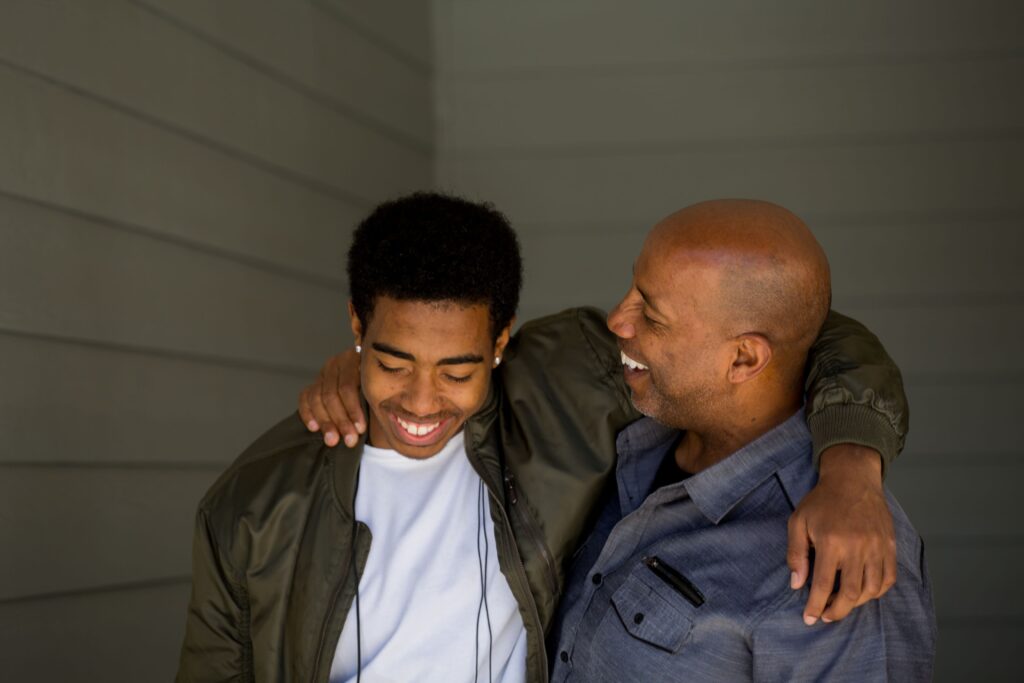
“I think a lot of men wish there were times when we weren’t told to suck it up. We want to feel understood” shared Derek Bassey, LPC, Lena Pope Family Therapist.
We’re all human, which means we experience a full range of emotions. However, seeing a therapist is still something that can feel uncomfortable to talk about; it’s not always accepted as normal. June is Men’s Health Month and at Lena Pope we believe mental health is just as important as physical health. It’s not unusual for men specifically to be hesitant to seek mental health support. This month we decided to talk it out with Derek, as a professional, to understand why men may be hesitant on the topic of mental health and to learn what we can do to better recognize and respect men’s feelings in the future.

Stigma Attached to Mental Health
Derek shared his belief that many men are told their role on this planet is to protect and provide, which requires them to be strong. Unfortunately, many men have been taught that showing certain feelings or being vulnerable is a sign of weakness. “If you’re mad in the locker room after a game – that’s cool, but if you are crying after a breakup or because someone hurt your feelings, that would not be ok. Showing emotion through tears seems to convey that you’re not tough enough, you’re not able to suck it up.” Derek adds that, in order to grow from therapy, you have to be willing to open yourself to change, to be vulnerable. This is especially hard for men to do if they have the false messaging in their head that vulnerability equals weakness, and if you’re weak then you’re not a man and you’re not doing your job of protecting and providing. Instead, the opposite is true. Taking care of yourself – both physically and mentally – allows you to be in a place where you can more effectively care for people in your life.
Internalized Messages from Our Childhoods
“When I hear a male parent of a client say, ‘Back in my day I was told to suck it up’, I always ask them how that made them feel as a kid. Many men will share that it didn’t feel good and that they wish the adults in their life would have recognized how they were feeling instead.” Derek went on to explain that when we tell kids to ignore their feelings, that perpetuates a cycle of not identifying your emotions and it tells young boys it’s not ok to feel different feelings, to be human.
“If we want to change the message we’re sending boys, we have to look at our own childhoods and internal messages and be honest about what things were good and what things don’t work anymore or never really worked,” Derek said.

Feelings Don’t Need to be Fixed, They Need to be Felt
Derek suspects that a lot of parents feel like they need to be problem solvers: “my kid is having these emotions and I’ve got to fix it.” But a lot of the time, what children want you to do is understand how they are feeling. “I encourage parents to reflect what they see their kid feeling in the moment. You can say to them, ‘I can see you’re really sad. You dropped your ice cream and that is disappointing.’ Then allow your kid to come up with their own solution. Noticing how they feel is a way for us to connect with our kids and help them move through their feelings instead of trying to distract them or move them past it. This accomplishes two things: it shows your kid that you understand and your kid feels understood.”
We want to teach kids how to handle different emotions, that it is ok to feel different feelings, but our behavior when we feel a certain way may not be ok. For example, it’s ok to be mad but it’s not ok to hit your brother when you are mad.
How to be a noticer:
- Look at your child
- Estimate what you think they are feeling
- Say “it looks like you’re feeling sad/angry/happy” (don’t worry, a lot of kids will correct you if they’re feeing something else!)
What To Do When I Don’t Get It Right
When you mess up (and we all do) you can go back and talk about it with your child. You can say, earlier I told you to suck it up, but I should have said “it looks like you’re sad” and then talked about that with you.
The same concept is true with teens and adults. When a young man opens up and is vulnerable, we want to make him feel supported and reinforce that talking about his feelings is a good thing. “I have heard a lot of men tell me they opened up but then they felt like it was used against them,” Derek shared. We need to be mindful and check our own ideas of what it looks like for a man to show emotions and practice how to help the men in our lives show emotions that may make us uncomfortable. If we respond in a way that we wish we could change or we know wasn’t our best, that is an opportunity to revisit that conversation and say, “I know I didn’t respond well the first time, I should have listened. Can we try again?”
Change and Growth
It takes a lot of strength to ask for help. It takes a lot of strength to be vulnerable. This Men’s Health Month, support the men in your life when they want to share something. Investigate your own ideas about how men show emotion and see how you can support someone feeling a range of human emotions. Remember: we are all changing and growing, it’s ok to challenge ideas you hold and see if they come from something that’s not helpful.
Let’s work together to teach the next generation of men that they can feel a full range of emotions and we’re here with them.